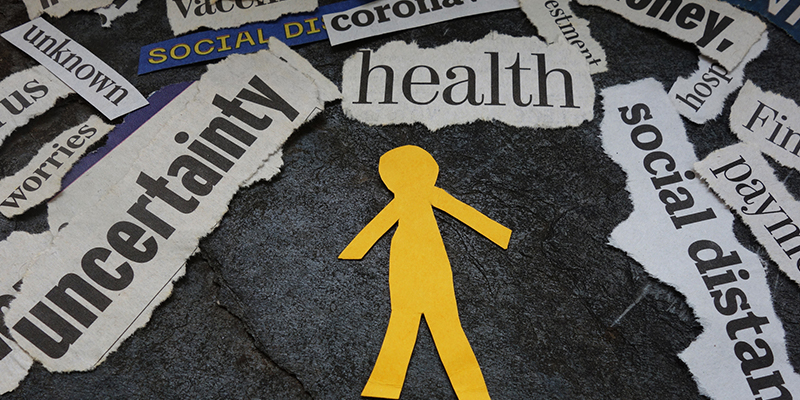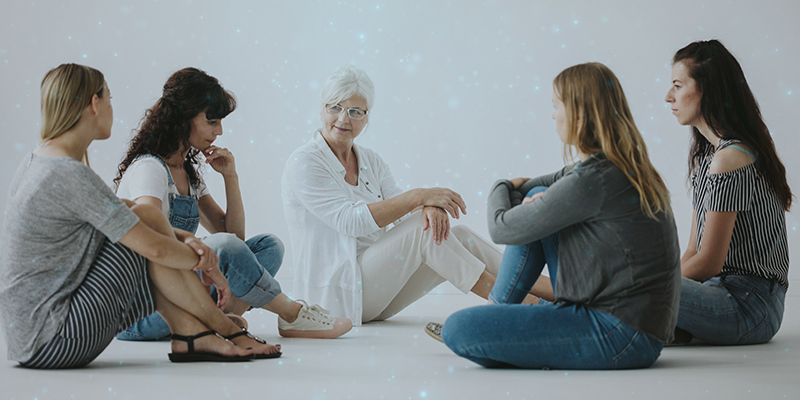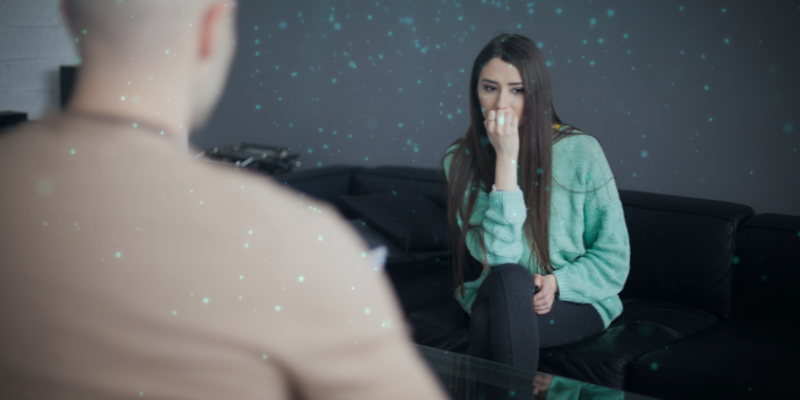
As scientists and researchers continue their ongoing work into the impact of the COVID-19 crisis, it has become blatantly clear that mental health problems are rising in the United States and around the world. This increase is not only in people with pre-existing mental illness or some of those who already survived the virus, but the psychological distress has also impacted a number of people who had never before been diagnosed with a psychiatric condition.
This news is almost enough to make anyone anxious or depressed!
Since the start of the pandemic, The National Center for Health Statistics is one of the institutions that has been tracking this information using the Household Pulse Survey. As of April 2021, results from their data collection show that 35% of U.S. adults have reported having symptoms of anxiety or depression every day or nearly half the days. From a comparison perspective, from January to June 2019 only 11% of people reported having the same symptoms. Another survey, a poll from the Kaiser Family Foundation, reported that as of March 2021, 47% of people continue to have adverse mental health problems from pandemic-related stress and anxiety.
These distressing statistics may have you wondering if this is simply the new normal and if you should just resign yourself to a life filled with angst. The answer is a resounding NO!
Pandemic Causes of Psychological Distress
Just when it seemed like we were starting to get ahead, certain states have cases surging again as more contagious variants proliferate. This, of course, may extend some of the struggles many people have been trying to manage for the past year, such as:
- Financial problems and employment issues
- Ongoing restrictions with social interactions
- Challenges with home-schooling
- Household tensions
- Isolation and loneliness
- Grief for people and activities that were lost or missed in the past year
- Fear of getting COVID-19 or that a loved one could get it
- Continued uncertainty about the future
It appears that younger adults, particularly women—and especially those with children at home—are struggling more with worry and stress during the pandemic. Aside from the concerns listed above, their normally higher need for social interactions with peers may be making them more vulnerable, because our time spent with others can often help buffer mental health symptoms. Getting together with friends, going to a gym, attending religious services, and community events have all been curbed to some extent in most places.
With these normal outlets unavailable to many people right now, it is no wonder that rates of mental illness have been growing. Are you concerned about yourself or a loved one?
Symptoms of Anxiety and Depression
While everyone has a bad day on occasion, when the following symptoms occur regularly, it could be an indication that anxiety or depressive disorder has developed.
Common Symptoms of Anxiety
- Worrying—and difficulty controlling your worries
- Feeling nervous, restless, or on edge
- Chronic muscle tension
- Fatigue
- Irritability
- Concentration problems
- Difficulty sleeping
Common Symptoms of Depression
- Feeling sad, hopeless, or empty
- Decreased or lost interest in activities you normally enjoy
- Feelings of worthlessness or guilt
- Fatigue
- Trouble thinking or concentrating
- Sleeping too much or too little
- Weight gain or loss
- Thoughts of suicide
Not everyone will have all the symptoms for either anxiety and/or depression, but even having a few of them can be a red flag that should not be overlooked. Reaching out to get professional help for treatment is an important first step to take so you can start feeling better.
Even having a few symptoms of anxiety and/or depression can be a red flag that should not be overlooked. Reaching out to get professional help for treatment is an important first step to take so you can start feeling better. Click To Tweet3 Lifestyle Strategies to Manage Stress, Worries, and Depressed Mood
To further support your mental health, the following 3 lifestyle strategies can help improve your symptoms and bring more balance into your brain and body even in the wake of a pandemic:
- Pay attention to your automatic negative thoughts (ANTs) because they are likely adding to your distress. Notice if you tend to think in terms of always or never, or if you predict the worst outcome for everything. You can learn to manage these ANTs by doing some reality testing using a simple technique borrowed from Byron Katie:
Start by identifying what the negative or stressful thought is, then ask yourself the following questions about it:
- Is this thought true?
- Can I absolutely know that it’s true?
- How do I feel when I believe this thought?
- How would I feel if I didn’t have this thought?
Then turn around your thought to its opposite and see if it isn’t actually truer than your original thought. Use a journal to write down each ANT and your answers to the questions. By practicing this, you can reduce the control they have over how you feel each day.
- Choose more nutritious foods and eat at regular intervals. This helps to stabilize your blood sugar and properly fuel your brain and body, which in turn can support your mental health.
Include foods like these:
- Plenty of fresh greens, vegetables, and fruit—especially berries
- High-quality protein
- Healthy fats like nuts, seeds, avocados, and fish that are high in omega-3s, such as salmon, tuna, and mackerel
And stay away from these:
- Sugar and other simple carbs: They increase inflammation and make you crave and eat more of them. This causes your blood sugar to rise and plummet which worsens depressive symptoms and anxiety.
- Alcohol: Although the momentary escape from your worries or low mood may seem tempting, alcohol is a depressant and can exacerbate your symptoms.
- Too much caffeine: Used in moderation—especially green tea—it can be helpful, but too much can make symptoms worse, particularly if you have anxiety. Caffeine blocks the adenosine receptors in the brain, thereby decreasing your ability to relax.
- Exercise regularly in any way you can. Whether it’s walking—even just around the block, hiking, jogging, swimming, biking, yoga, or lifting weights at the gym, exercise is a natural antidepressant and anti-anxiety treatment. It boosts chemicals in the brain that reduce pain and stress and lift your mood.
We must continue navigating the persistent challenges brought about by the COVID-19 pandemic—at least for the foreseeable future. Therefore, by reaching out for help when you need it and incorporating healthy lifestyle strategies like these, you can start to reduce your symptoms and build more resilience as you move forward during these unpredictable times. It’s up to you to create your own version of the new normal.
Anxiety, depression, and other mental health problems can’t wait. During this time of uncertainty, your mental well-being is more important than ever.
At Amen Clinics, we’re here for you. We offer in-clinic brain scanning and appointments, as well as mental telehealth, remote clinical evaluations, and video therapy for adults, children, and couples. Find out more by speaking to a specialist today at 888-288-9834 or visit our contact page here.





Anyone else so tired of the little things? I am so tired of having to call ahead to visit my mom in assisted living. I am so tired of their locked doors and having to wait to have someone let me in and take my temperature.
And at least I have my job but I’m so tired of the changes Covid has brought to my hours. Hopefully back to normal in three months.
Thanks so much for listening
Comment by Lisa — May 5, 2021 @ 3:28 AM
Great article. There is hope!
Comment by Timothy Lee — May 5, 2021 @ 6:12 AM
Don’t know if my boyfriend of 5 years really loves me
Comment by Tina Herman — May 5, 2021 @ 10:22 AM
What do you suggest for someone experiencing these symtoms?
Comment by Laura — May 5, 2021 @ 10:41 AM
Lisa… YES!!!
I Take care of my elderly mom . I have four kids… older… youngest though is 16 and having such a time with anger and depression over this. She was never like this. Mentally and emotionally it brought me to places I haven’t been in over 30 years. I just got home from visiting my elderly dad in a state far away in the hospital because he had fallen. He’s on dialysis and they gave him a bacterial infection where they put his port. He became so weak he fell and wasn’t found till the next morning. Various family members visited him daily at the hospital and yet last Friday his doctor moved him without any of our knowledge or any discussion to an acute care facility… One where you cannot have in person visits only through the window. You can imagine my disbelief, anger and sadness. So much about this has been handled so poorly not just my father I’m talking the entire last year situation everything. And so yes I am on very heightened anxiety. And I eat well and exercise and yet I feel like I’m losing my mind. One of the hardest things for me is controlling the ants that Dr. Amen talks about above. My brain doesn’t even seem to think clearly in most cases now it’s always in a fog on a really bad Spinning ride. So before you can get rid of those ants you have to recognize them and that’s where I’m struggling so badly I go through a day and then usually when I lie in bed I’m like oh that was an aunt but I don’t recognize it when I need to. Maybe I’m the only one struggling that way but the thing I need to do is the most difficult and challenging right now.
Comment by Christian — May 6, 2021 @ 7:12 AM
Thanks for this article, it’s very relevant. My dad and aunt both passed away, and we lived in units next to each other in the same condo building. Homeschooling stresses and works stress. I am only able to take it one day at a time, and give myself tons and tons of grace, since my dad died. I eat healthily and exercise, and managed anxiety in the past, but the self-care tools I used to use aren’t working as effectively now. So one day at a time is my best tool now, and prayer for help daily.
Please wrote more articles on this!
Comment by Tiffany — May 6, 2021 @ 5:32 PM
I couldn’t pay attention to my ANTS even if I wanted to, which I DO! I have been ill since January 21, & have suffered from recurrent severe depression, periodically over 50 long yrs! Usually, with painstakingly determined efforts, I have pulled through eventually, but this bout feels different, & I am filled with huge apathy & procrastination. But I have completely lost my appetite this time round & just cannot eat normally, even though I want to, & I know the importance of healthy food, especially with regard to mental health. I am suffering monumental anhedonia & can’t see any way forwards. I can’t make the simplest of decisions & think I am going quite insane. Would ECT help me, or is this more likely to be the onset of dementia? To have all this happening on top of the very isolating Covid rules, is unbearable. I need help……
Lyn. B.
Comment by Lyn Bowler — May 18, 2021 @ 8:45 AM
Hello there! People who go through depression and anxiety may seem less than hopeful about the possibilities of changing their lives. Most people are getting upset due to anxiety or can say that dealing with anxiety and one of the top reasons can be this pandemic COVID-19. Everyone is going to bear the brunt of this difficult time that has caused mental turmoil. Hope that everything goes well soon and as before. Thanks for sharing the article!
Comment by depression and anxiety — May 19, 2021 @ 5:18 AM